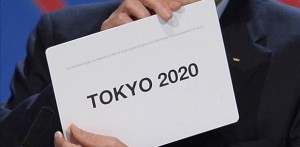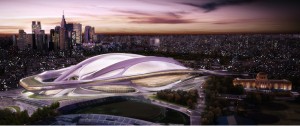 Well, maybe it’s all been said. The logic for the IOC revolved around risk aversion and …money. The upshot is that Japan’s solid economy, position in and gateway access to Asia, Tokyo’s well-planned compact city bid and their strong sponsorship base proved to be winning elements of the sometimes nebulous successful formula. That their presentations were very good also counted.
Well, maybe it’s all been said. The logic for the IOC revolved around risk aversion and …money. The upshot is that Japan’s solid economy, position in and gateway access to Asia, Tokyo’s well-planned compact city bid and their strong sponsorship base proved to be winning elements of the sometimes nebulous successful formula. That their presentations were very good also counted.
The money side is important: Tokyo projects a $958 million domestic sponsorship revenue stream. Their revenue forecast is over $200 million more than the $725 million London projected in its bid for the 2012 Games, and almost double Rio’s $570 million projection for 2016.
Much has been made of the impact on property in Tokyo Bay, the employment effect, the value to Tokyo of the Games as the country rebuilds from the earthquake, tsunami and Fukushima problems, and the opportunity to drive overseas tourism. There is no doubt that the years to 2020 will see the appearance of more english-language signs than ever before.
There will likely emerge serious competition among top Japanese companies to be Games sponsors – at a national and local level. And perhaps the geo-realities may  see a new category of sponsors who are focused on the Asia market. Certainly, Asia presents a massive audience for the Tokyo games and with the widespread presence of Japanese companies around Asia, the games will become an important relationship platform.
see a new category of sponsors who are focused on the Asia market. Certainly, Asia presents a massive audience for the Tokyo games and with the widespread presence of Japanese companies around Asia, the games will become an important relationship platform.
The experience of previous Olympics in the area of science and technology will be eclipsed: Sydney had its Australian Technology Showcase; Beijing implemented major projects and systems in water, environmental, bio-security and food safety, urban management; London created major exposure across technology, manufacturing and services and has gone on to market that capacity globally. I expect to see Japan place much emphasis on this area of potent legacy.
Rowan Callick in The Australian on 9 September wrote “The history of the Games underlines how important they have been in providing a platform for countries to send a message to the world about how they’ve changed and stepped up. …. The 1964 Games enabled Japan “to proclaim to the world how it had reinvented itself after the war”. Now the message he [Prime Minister Shinzo Abe] will relay…is that Japan has regained its mojo, that it will astonish the world with its hi-tech innovations, with its enthusiasm for sport, with its embrace of nationalism.”
Rick Wallace, The Australian’s correspondent in Tokyo, wrote “Greater Tokyo, although it is the largest single metropolis in the world, operates with a serenity that has to be experienced to be believed, thanks in part to a peerless transport system and the innate good manners of a people who have perfected the art of living harmoniously in close quarters.
The bid committee vowed to make this the most compact Games ever, with the venues — including a space-age new stadium whose design looks a bit like a bike helmet — located within a 10km radius of the city centre. That should help with atmosphere. Keeping fans together in a tight urban core, in a city that boasts the infrastructure to move, feed and shelter them effectively, should create a wonderful buzz about the event.
Spectacular and convenient — that's a tough double to land, but Tokyo should achieve it easily.
About 90% of the competition venues will be located within 8 kilometres of the Olympic Village in Harumi, an area of reclaimed land southeast of downtown Tokyo, according to the Tokyo 2020 Bid Committee. Apartment prices in the area may increase as much as 20 percent, said Sanyu Appraisal Corp., a property appraisal company. The capital is planning its biggest housing complex in 42 years to lodge athletes in Harumi. The 95.4 billion yen Olympic Village complex will occupy a 44-hectare parcel of land next to Tokyo Bay and will be financed by developers. The Olympic Village complex, which is to be located in the middle of two main competition zones, will consist of luxury apartments surrounded by Tokyo Bay, with a view of the Rainbow Bridge that connects central Tokyo with the Odaiba area, which sits on reclaimed land, the bid documents show. It will comprise 10,860 residential units spread across about two-dozen buildings, along with training gyms, dining halls, seaside restaurants and parks, according to the bid documents.
New Millennium Business congratulates Tokyo and the Australian specialists who worked closely with the bid committee to achieve this success…including Diane Bernstein, Simon Balderstone, Neil Fergus, Bob Costello.
If you'd like to watch the final presentation by Tokyo 2020 to the IOC Congress – click here
For a video about the planned venues for Tokyo – click here
Is Japan cool? – click here






